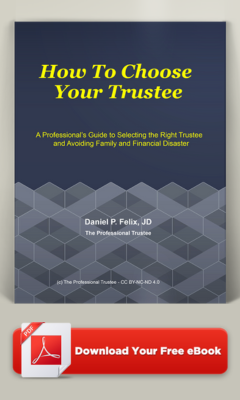You would think that anyone who participates in a trust would want the trust handled “successfully”
You would think that it wouldn’t matter whether you’re
- the trust creator who is setting up the trust, or
- the beneficiary, receiving the benefits from the trust creator, or
- the trust and estate attorney designing the trust, or
- the trustee administering the trust, or
- one of the many important trusted professionals supporting the trust or the family.
We should all want the trust to be successful.
Would anyone even admit to wanting an unsuccessful administration?
But what makes the administration of a trust successful? How do we define a successful trust?
And who gets to participate in that definition?
Is success simply accomplishing the transfer of the trust’s assets from the grantor to the beneficiary? Or could success also be helping the family to appreciate that gift?
Is success simply avoiding legal claims and lawsuits? Or could success also be helping the family thrive more harmoniously?
Is success honoring the freedom of the grantor to decide how she wants to use her assets? Or could success also be to help the beneficiary to use the trust assets to enhance her freedom?
Though every trust and family is different, perhaps we can do better in defining our goals by considering some known issues, inescapable components of trusts and trust administration that can make — or break — the trust.
Legal Considerations:
The trust laws impose boundaries on acceptable administration to prevent abuse and otherwise establish minimum standards. These are important protections for the various trust participants. The necessity for these laws is underlined by continued reports of their violation by even well-meaning trustees — and far too often by unprepared family members and even professionals acting as trustee! That these violations are ongoing is also evidenced by the existence of a dedicated plaintiffs’ fiduciary bar.
As essential as these legal minimum standards are, however, they should not be confused with best practices or success. In fact, as the articulation of the minimum standards, the law is not the best practice by definition.
And so, it shouldn’t be surprising that too often the trustee damages the family by administrating from the minimum standard that the law requires as opposed to what the family needs. In other words, trust administration that abides perfectly by the letter of the law may still be abhorrent or even destructive to the family.
In addition to paying attention to the legal minimums, a successful trust often takes into consideration the following:
- Acknowledging the unique dynamics of each family.
- The opportunity to build a strong relationship with the on-boarding of the trustee.
- Setting an appropriate course for administration: the investment and distribution policy statements.
- Providing financial and other helpful communications, including trust accounting.
- Avoiding disputes during administration by communicating and building relationships.
- Leveraging legacy and meaning.
- Attending to others through generosity and philanthropy.
- And for sticky situations, using the win-win tool of mediation and when all else fails, trustee resignation
What would you say is a successful trust — and what goes into making it a success?
Photo by Christian Bowen on Unsplash© 2015 – 2023 Daniel P. Felix, all rights reserved.


